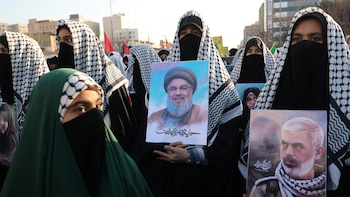
The exiled president of Yemen resigned from office on Thursday and transferred his powers to a presidential council after regional and international efforts to end the country's long civil war gained momentum from the agreement for a two-month truce.
Saudi Arabia and the United Arab Emirates, two nations with a significant role in the conflict, appear to have influenced President Abed Rabbo Mansour Hadi's decision, and responded immediately with a pledge of aid amounting to $3 billion. The president of the new council has close ties with Riyadh.
Whether change will accelerate the end of the conflict remains to be seen, as UN-sponsored negotiations are at a standstill and fighting, air and missile strikes continued until the end of last month. The Houthis did not immediately comment on Hadi's announcement.
Peter Salisbury, an expert on Yemen at the International Crisis Group, described the transfer of power as “great news” and explained on Twitter that “it is the most significant change in the internal workings of the anti-Houthi bloc since the beginning of the war.”

According to Hadi, the new council will lead the internationally recognized government and negotiations with the Houthi rebels, who are supported by Iran, according to a statement released by state media.
The move seeks to unify the opposition against the Houthis after years of fighting and internal quarrels and was almost certainly orchestrated by Riyadh, where Yemeni factions met last week to discuss efforts to end the war.
“With this statement, a Presidential Leadership Council will be established to complete the implementation of the transitional period tasks. I irreversibly delegate all my powers to the Presidential Leadership Council,” Hadi told the Yemeni state television station.
Hadi dismissed his vice-president, Ali Mohsen al-Ahmar, a powerful military post, and delegated his powers to the council as well.

Rashad al-Alimi, an adviser to Hadi and former Minister of the Interior of the government of the late President Ali Abdullah Saleh, will head the new body. Al-Alimi has close ties with Saudi Arabia and other political groups in Yemen, including the powerful Islah party, the transnational branch of the Muslim Brotherhood in Yemen.
The council has seven other members, all of whom have political or military influence on the ground in Yemen. One of them is Aydarous al-Zubaidi, president of the Southern Transitional Council, a secessionist group that encompasses several heavily armed and well-funded militias that have been backed by the Emirates since 2015.
Hadi was appointed president of Yemen in 2012 with the aim of overseeing a democratic transition after the Arab Spring uprising ended Saleh's long rule.
But the Houthis, a religious movement turned into a radical militia, allied themselves with Saleh and took the capital, Sana'a, in 2014, forcing Hadi and his government into exile in Arabia.

Months later, Riyadh formed a military coalition and intervened in the war to try to restore power to the Hadi government.
In recent years, the conflict has evolved into a regional war by delegation that has claimed the lives of more than 150,000 people, including more than 14,500 civilians, and caused one of the worst humanitarian crises in the world.
Welcoming Hadi's decision, Saudi Arabia urged the presidential council to join UN-led negotiations with the Houthis to find a “political, definitive and comprehensive” solution to the conflict, according to state-run news agency Saudi Press.
The powerful Saudi crown prince, Mohammed bin Salman, also met with the entity, reported the country's state television station.
The warring sides announced at the beginning of the month a two-month truce, the first nationwide truce in Yemen in six years.
(with information from AP)
KEEP READING:
Últimas Noticias
Debanhi Escobar: they secured the motel where she was found lifeless in a cistern
Members of the Specialized Prosecutor's Office in Nuevo León secured the Nueva Castilla Motel as part of the investigations into the case

The oldest person in the world died at the age of 119
Kane Tanaka lived in Japan. She was born six months earlier than George Orwell, the same year that the Wright brothers first flew, and Marie Curie became the first woman to win a Nobel Prize

Macabre find in CDMX: they left a body bagged and tied in a taxi
The body was left in the back seats of the car. It was covered with black bags and tied with industrial tape
The eagles of America will face Manchester City in a duel of legends. Here are the details
The top Mexican football champion will play a match with Pep Guardiola's squad in the Lone Star Cup

Why is it good to bring dogs out to know the world when they are puppies
A so-called protection against the spread of diseases threatens the integral development of dogs




